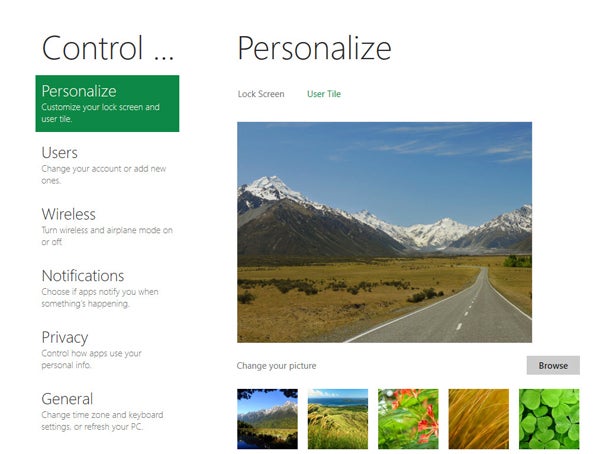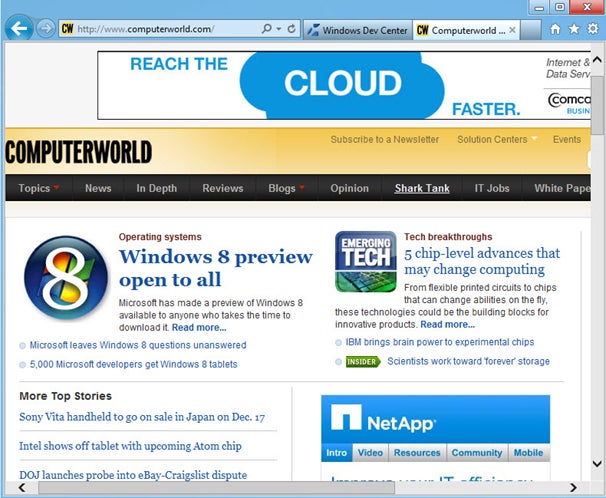The bottom line: AVG Free 2012's renewed focus on performance keeps scans zippy, but struggles with slowing down your boot time and too many false positives.
Review:
The never-ending mantra chanted by security suite vendors sounds a lot like "faster scans, easier to use, better performance," and AVG has released a new version that it says accomplishes all three. Certainly, the scans are faster, it does install more quickly, and some tweaks to the interface have made it easier to view. Two new core security changes will make you safer, too.
 |
| Download Now (3.72MB) |
Download Now (3.72MB)
Installation
We found that the program can go from completed download to ready to use in about 5 minutes.
Last year, AVG cut down the number of installation screens from 13 to 5. This year, the process continues to be short, but savvy users will want to be wary of a few things. First, if you have a browser open when installing, AVG will not warn you before it forces it to close. Second, you are opted-in to AVG's Security Toolbar and the Secure Search default search engine change. Users who opt out of installing the toolbar but want it later will need to rerun the installer to get it.
On the polite side, AVG does not opt you in to an automatic AVG Internet Security trial. By starting from a null position, you are required to actively choose to install AVG Free or the 30-day trial of AVG Internet Security. So this year's install procedure is a bit of a crapshoot, better in some ways than last year, but unchanged in others.
Interface
The changes to AVG's interface in the 2011 version were minor but actually improved usability quite a bit. This year, the tweaks are even less pronounced. There's not much different besides redoing the icons in the main interface so they're easier on your eyes.

AVG Free's slightly tweaked interface for 2012.
(Credit:
Screenshot by Seth Rosenblatt/CNET)
Joining the one-click Update button on the side nav is a one-click Scan Now button. There's a clean look to the nav, as well, with bigger fonts and timestamps for the most recent scan and most recent update.
AVG has placed icons for its security components in a central pane. Double-click on one to access more information and basic configuration settings for each specific tool. Advanced settings are available under Tools on the menu bar at the top of the window.
The new interface changes are small, no doubt, but they do make AVG easier to use.
Features and support
AVG 2012 includes a couple of solid changes to make you safer. The first is a patent-pending technique for identifying one of the most obnoxious threats to ever reach your computer: the fake antivirus. If you're unfamiliar, these programs purport to be an antivirus, or a Web-based antivirus scan. Once they install on your computer, the only way to get rid of the infection is to "buy" their license. They're also related to the ransomware infections, which don't even bother with the effort to pretend to be an antivirus. AVG 2012 will block both of them.
The LinkScanner tool has been improved to watch out for more dynamic code, which is essential in the security game because threats are mutating at such a rapid rate. Meanwhile, premium users get the new AVG Accelerator option, which optimizes your Internet connection to speed up downloads and rendering. It currently works on two sites: YouTube, and you can see its impact when pausing and unpausing videos; and Download.com binary downloads. The accelerator protocol was developed internally at AVG.
AVG now includes a monitoring tool that automatically warns you when Firefox, Chrome, or Internet Explorer consumes too much memory. Called AVG Advisor and in all of the AVG suites, it opens a small pop-up and asks you if you'd like to restart your browser. There's no way to "force" it to activate, although if you open up a couple dozen tabs, wait a few minutes, and then open another dozen or so, it ought to kick in.
Changes made last year are still relevant. The software offers what it calls "smart scanning," which leverages AVG's behavioral detection network to scan known safe files once, and only rescan them if it detects changes. As with its competitors, AVG's network is made up of its user base anonymously contributing data up to the cloud. You can choose to opt out of contributing your data when you install, or from the options menu. AVG says opting out won't negatively affect your security.
The smart scanning tech also gives you a built-in system resource manager that prioritizes scans. If a scan is scheduled to begin while the computer is in use, it will automatically restrict the scan so that it runs slower but doesn't interfere with the computer's other tasks. When it detects the computer idling, it will then allocate more power to the scan. The feature comes with a slider so you can customize how sensitive it is.
The desktop gadget for Windows Vista and Windows 7 users that lets them initiate scans and updates with one click, without having to open the full interface. It also contains links to AVG's Twitter and Facebook pages, which the company uses to bolster its support for the free version.
The PC Analyzer scans your system for Registry and disk errors. It includes a disk defragmenter and a broken-shortcut cleaner, as well. Although the feature is restricted in full to paid users, if you have the free version, the PC Analyzer comes with a one-time offer to clean all errors it finds. It provides a link to download the separate PC Analyzer tool, once the scan is completed. This is an interesting twist on the idea of letting users detect but not repair errors, and it provides more functionality while not affecting the basic security of your computer. However, it's likely that some users will shy away from the extra download.
Other features are restricted to users of AVG's paid upgrades. The paid upgrade version of AVG Anti-Virus 2012 distinguishes itself by offering chat link shield, a download scan for files sent via instant message that looks at all ports, not just port 80, and telephone support 24 hours a day, seven days a week. The PC Analyzer option mentioned earlier is also included, and comes without restrictions. New in 2012 to premium users is the new AVG Accelerator option, which optimizes your Internet connection to speed up downloads and rendering. It currently works on two sites: YouTube, and you can see its impact when pausing and unpausing videos; and Download.com binary downloads. The accelerator protocol was developed internally at AVG.
AVG Internet Security 2012 includes all that AVG Anti-Virus 2012 offers, and adds in a firewall and antispam protections.
Performance
AVG claims some major performance enhancements in the 2012 versions. Specifically, the company says that it has reduced by 40 percent the size on your hard drive of the virus signature database. That database is a major component of how the program recognizes threats. AVG also stated that the number of running processes that run suite has been reduced from 16 to 11, that it uses 20 percent less memory overall than previous versions, and that it ought to impact your computer's boot time less.
CNET Labs' benchmarks found that, on the whole, it is a faster program than last year's. However, we can't directly compare this year's results to last year's because we upgraded our testing computer from Windows 7 x64 to Windows 7 x64 with Service Pack 1. We can report that AVG's boot time impact was slower than average, ranging from 2 seconds slower than the average suite from AVG Free to 18 seconds slower than average for AVG Anti-Virus. AVG Internet Security was a few seconds slower than AVG Free. This is not unusual for AVG, as it historically has a big impact on startup, but that doesn't mean we don't want to see it get faster.
Shutdown impact continued to be minimal. Security scan times were the third-fastest suite we've seen so far year, though not as good as last year's tied-for-fastest numbers. The impact of the suites on the computer while in use were very similar to last year's--in general, slightly better than average, but not stellar.
| Security Program | Boot time | Shutdown time | Scan time | MS Office performance | iTunes decoding | Media multitasking | Cinebench |
|---|---|---|---|---|---|---|---|
| Unprotected system | 40 | 6 | n/a | 395 | 120 | 342 | 17,711 |
| Average of all tested systems (to date) | 64.3 | 16.6 | 1,185 | 418 | 125 | 348 | 17,111 |
| AVG Anti-Virus Free 2012 | 66.3 | 12 | 753 | 411 | 125 | 347 | 17,131 |
| AVG Anti-Virus 2012 | 82.3 | 13.7 | 842 | 410 | 124 | 346 | 17,026 |
| AVG Internet Security 2012 | 69.9 | 11.3 | 792 | 416 | 124 | 344 | 17,259 |
*All tests measured in seconds, except for Cinebench. On the Cinebench test, the higher number is better.
In our other tests, it was a bit faster than the median. It's not a big shift from last year, but it's enough to notice that it's moving in the right direction. You're looking at a much slower startup, fast scans, a minimal impact on shutdown, and a midrange hit to general system performance with AVG Free.
Third-party efficacy results haven't been published yet for AVG Anti-Virus Free 2012, but the 2011 suite marks are solid, if not spectacular. In the AV-Test.org test on Windows 7 from the first quarter of 2011, AVG Internet Security 10 (version 2011) scored 13.5 out of 18 overall, a solid midrange score. The suite had a 5.0 rating out of 6 in Protection, a 4.0 in Repair and a 4.5 in Usability.
The second quarter 2011 test, on a Windows XP computer, definitely showed improvement in some areas and regression in others. It scored 13.0 out of 18 overall, also a midrange score. The suite improved in Protection and Repair with a 5.5 rating out of 6 for the former and a 4.5 for the latter, but Usability dropped to 3.5 most likely due to false positives.
The most recent AV-Comparatives.org Whole Product test, which looks at on-demand scanning, retroactive tests, and "real-world" guards including cloud-based protections, puts AVG Internet Security 2011 toward the back of the class, out of 17 suites tested. Looking at Whole Product test results cumulatively from January 2011 to June 2011 found that AVG came in 13th, blocking 95.1 percent of threats. Much of that low score came from bad showings in March and April; by May it was back up in the 96 percent range.
It's fair to conclude that according to these third-party tests, AVG has been moderately effective, with some indications that it's been getting better in recent months. However, since AVG Internet Security and AVG Anti-Virus Free share the same engine, you're getting a strong level of protection at no cost.
Conclusion
A word of caution: We've noted before that the average person is paying more and more attention to performance, and there are far more viable operating system options than ever before. If security is more or less similar, people will be scrutinizing system impact greatly, and adding 30 seconds or more to your boot time has the potential to drive people not just from your security suite, but from your OS, too.
All that said, AVG Anti-Virus Free continues to offer an excellent if not perfect level of security, and is well-worth a serious shot at being your go-to suite.













































